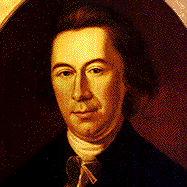Livingston, Robert

Livingston, Robert R. (1746-1813) Diplomat: Born into a politically prominent family, Livingston studied law and was admitted to the bar in New York in 1770, forming a partnership with John Jay. He served several terms in the Continental Congress, supported the Revolution, and helped draft the first constitution for New York State in 1777. In 1781, Congress appointed Livingston Secretary of the newly-created Department of Foreign Affairs. He served for two years, and was highly successful in providing information on European affairs, recruiting personnel, and setting-up standards for diplomatic practices. Livingston supported the proposed federal Constitution at the New York ratifying convention in 1788.
After the new federal government was established, he opposed Alexander Hamilton's financial policies, supporting the Republicans in New York state. Livingston also opposed the Jay Treaty in 1795, publishing his Examination of the Treaty of Amity, Commerce, and Navigation, Between the United States and Great Britain under the name "Cato." In the same year, he unsuccessfully ran for governor of New York, against John Jay. Livingston was named minister of France in 1801, in which post he negotiated the purchase of Louisiana. He retired from public life in 1804, after which he concentrated on his interests in science and agriculture, as well as kept up extensive correspondence with Washington, Jefferson, and several European friends. Livingston founded the American Academy of Fine Arts, and gave technical and financial support to the development of steamboats. He attempted to hold a monopoly over steam navigation on New York waterways; eleven years after his death, the US Supreme Court foiled his attempt in the Gibbons v. Ogden case.
 >
>